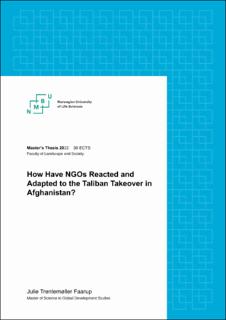| dc.description.abstract | This thesis explores how NGOs have reacted and adapted to the recent Taliban takeover in Afghanistan on the 15th of August 2021, and how the impact of the changing relationships between the international NGOs, the national NGOs and the Taliban have helped or hindered their ability to work in the country.
Using a qualitative method for data collection, primary data was collected using in-depth interviews with informants working for NGOs that are operating in Afghanistan. The thesis uses social exchange theory as a theoretical framework to better understand the changing relationships between these actors.
Emerging from interviews were four key themes that were identified to look at the legitimacy of the de facto government, economic challenges, bureaucratic impediments, and women participation in work and society. While INGOs and national NGOs all have been forced to work in humanitarian assistance through donor conditionalities, there are still differences in how they have adapted to the current situation. Though the IEA remain unrecognized by the international community, there has clearly been a consensus to continue working with them. Both national and international NGOs see communication with the Taliban as an opportunity to get the Taliban to recognize the importance of their work. Both INGOs and national NGOs suffer from the economic sanctions and the ability to transfer funds. INGOs have had better access to funds than the national NGOs which has allowed them to be able to adapt and increase humanitarian assistance quickly. INGOs have had a more legitimate line of communication with the Taliban compared to national NGOs which have allowed them to respond more effectively with bureaucratic interference. Lastly, despite increasing restrictions by the Taliban administration on mobility, participation in society and education for girls, INGOs have been able to show more adaptation due to flexible budgeting. Despite the constantly changing restrictions being imposed on INGOs and national NGOs by the Taliban, they continue to find new and innovative ways to deliver humanitarian assistance across Afghanistan. | en_US |

